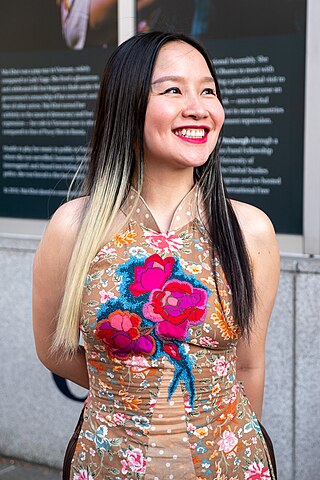
Instant messaging (IM) technology is a type of synchronous computer-mediated communication involving the immediate (real-time) transmission of messages between two or more parties over the Internet or another computer network. Originally involving simple text message exchanges, modern IM applications and services tend to also feature the exchange of multimedia, emojis, file transfer, VoIP, and video chat capabilities.

Meebo was an instant messaging and social networking service provider. It was founded in September 2005 by Sandy Jen, Seth Sternberg, and Elaine Wherry, and was based in Mountain View, California. Initially the company offered a web-based instant messenger service, extending its offer in more general online chat and even social networking directions. In June 2012, Google acquired Meebo to merge the company's staff with the Google+ developers team.

The Voice of Vietnam is the Vietnamese national radio broadcaster. Directly run by the government of Vietnam alongside the Vietnam Television (VTV) and the Vietnam News Agency (VNA), VOV is tasked with promoting the policies of the Communist Party and the laws of the state.
Microblogging is a form of blogging using short posts without titles known as microposts. Microblogs "allow users to exchange small elements of content such as short sentences, individual images, or video links", which may be the major reason for their popularity. Some popular social networks such as X (Twitter), Threads, Tumblr, Mastodon and Instagram can be viewed as collections of microblogs.
Badoo is a dating-focused social network founded by Russian entrepreneur Andrey Andreev in 2006. It is headquartered in Limassol, Cyprus and London, United Kingdom, with offices in Malta, Russia and the United States. It operates in 190 countries and is available in 47 languages, making it the world's most widely used dating network. The app is available on iOS, Android, and the web. Badoo operates on a freemium model, whereby the core services can be used without payment.

VNG Corporation, also recognized by its former brand name, VinaGame (VNG), is a Vietnamese technology company founded in 2004. It specialises in digital content, online entertainment, social networking, and e-commerce. Its focus is on four main businesses, including online games, platforms, digital payments, and cloud services. VNG is responsible for the development of products such as Zalo, ZaloPay, Zing MP3, and 123phim.
Internet censorship in Vietnam is implemented in the country, according to a 2009 report from Reporters Without Borders. Vietnam regulates its citizens' Internet access using both legal and technical means. The government's efforts to regulate, monitor, and provide oversight regarding Internet use has been referred to as a "Bamboo Firewall".

Posterous was a simple blogging platform started in May 2008. It supported integrated and automatic posting to other social media tools such as Flickr, Twitter, and Facebook, a built-in Google Analytics package, and custom themes. It was based in San Francisco and funded by Y Combinator.
Facebook is a social networking service that has been gradually replacing traditional media channels since 2010. Facebook has limited moderation of the content posted to its site. Because the site indiscriminately displays material publicly posted by users, Facebook can, in effect, threaten oppressive governments. Facebook can simultaneously propagate fake news, hate speech, and misinformation, thereby undermining the credibility of online platforms and social media.
PLUN.ASIA, formerly PLU-N.COM, was a bilingual social networking service that catered to the Vietnamese gay community worldwide. A digital brand of DWM Inc., it provided tools to help users find and connect with friends. Its slogan was "He's Here", reflecting the site's mission to help singles find their dream boys. In November 2010, it declared its business model, a gay dating and social networking site, the only one of its kind in Vietnam and Asia. It is believed to compete with Fridae and gaydar in the Vietnam market.

Google+ was a social network that was owned and operated by Google until it ceased operations in 2019. The network was launched on June 28, 2011, in an attempt to challenge other social networks, linking other Google products like Google Drive, Blogger and YouTube. The service, Google's fourth foray into social networking, experienced strong growth in its initial years, although usage statistics varied, depending on how the service was defined. Three Google executives oversaw the service, which underwent substantial changes that led to a redesign in November 2015.
This page is a timeline of social media. Major launches, milestones, and other major events are included.
Censorship in Vietnam is pervasive and is implemented by the Communist Party of Vietnam (CPV) in relation to all kinds of media – the press, literature, works of art, music, television and the Internet. The government censors content for mainly political reasons, such as curtailing political opposition, and censoring events unfavorable to the party. In its 2021 Press Freedom Index, the Reporters Without Borders (RSF) ranked Vietnam as "very serious" at 174 out of 180 countries, one of the lowest in the world and the worst ranking on their five-point scale. Similarly, Freedom House's 2021 Freedom on the Net report classifies Vietnam as "not free" in relation to the Internet, with significant obstacles to access, limits on content and significant violations of user rights.
Zalo is a Vietnamese instant messaging multi-platform service developed by VNG. Zalo is also used in other countries outside of Vietnam, such as the United States, Japan, South Korea, Australia, Germany, Myanmar and Singapore.

Vero is a social media platform and mobile app company. Vero markets itself as a social network free from advertisements, data mining and algorithms.
MeWe is a global social media and social networking service. As a company based in Los Angeles, California it is also known as Sgrouples, Inc., doing business as MeWe. The site has been described as a Facebook alternative due to its focus on data privacy.

Đỗ Nguyễn Mai Khôi, known professionally as Mai Khoi, is a Vietnamese singer, artist, and political activist. Described as the "Lady Gaga of Vietnam" and also compared to Russian artist-activists Pussy Riot, she began as an award-winning pop singer before her outspoken criticism of the Government of Vietnam's censorship and lack of democracy led to government persecution and restrictions on her freedom of speech. Khôi has also criticised Google and Facebook for cooperating with internet censorship in Vietnam. In 2018, she received the Václav Havel Prize for Creative Dissent in recognition of her democracy activism, and in 2021, she was awarded the Four Freedoms Freedom of Speech award.
The DeGoogle movement is a grassroots campaign that has spawned as privacy advocates urge users to stop using Google products entirely due to growing privacy concerns regarding the company. The term refers to the act of removing Google from one's life. As the growing market share of the internet giant creates monopolistic power for the company in digital spaces, increasing numbers of journalists have noted the difficulty to find alternatives to the company's products. Some projects, such as ungoogled-chromium, primarily distinguish themselves from Google-maintained products by their lessened dependence on the company's infrastructure. It can be seen as part of a broader opposition to big tech companies, sometimes referred to as "techlash."
Comparison of user features of messaging platforms refers to a comparison of all the various user features of various electronic instant messaging platforms. This includes a wide variety of resources; it includes standalone apps, platforms within websites, computer software, and various internal functions available on specific devices, such as iMessage for iPhones.

The government of Vietnam prepared for the COVID-19 pandemic as early as the first cases in China emerged in December 2019, and pursued a zero-COVID strategy until September 2021.









